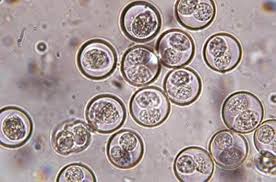Beating the Bug: Caring for a Foster with Coccidia
When you open your home to a foster pet, you may encounter a variety of medical needs. One of the more common conditions we see in shelter animals, especially puppies and kittens, is Coccidia. Knowing what it is, how it spreads, and how to care for a foster with this condition will help you feel prepared and keep your household pets safe.
What is Coccidia?
Coccidia is a microscopic parasite that lives in the intestines. It is most often seen in puppies and kittens because their immune systems are not yet strong enough to fight it off, but adult dogs and cats can also be affected. The parasite spreads through ingesting infected feces or contaminated soil, surfaces, or water. In a shelter environment, where many animals are housed together, it is fairly common.
Signs and Symptoms
Coccidia affects the digestive tract, so the most common symptom is diarrhea. In mild cases, you may notice soft or loose stools. In more severe cases, stools may be watery, contain mucus, or occasionally streaks of blood. Other signs can include:
• Dehydration
• Weight loss or failure to thrive
• Lethargy
• Loss of appetite
Because diarrhea can lead to dehydration quickly, especially in young animals, it’s very important to report these symptoms right away.
How It’s Treated
If your foster pet is diagnosed with Coccidia, our veterinary team will prescribe a specific medication to eliminate the parasite. The medication is usually given once or twice daily for several days. It’s important to give every dose as directed and finish the full course of medication, even if your foster seems better.
In addition to medication, keeping your foster well hydrated and eating is crucial. Encourage food intake with high-value, easy-to-digest meals, and make sure fresh water is always available.
Caring for Your Foster at Home
While your foster is recovering, create a calm, clean space for them to rest. Because Coccidia is contagious to other dogs and cats, your foster should remain separated from your personal pets until cleared. Always wash your hands after handling them, and clean up accidents immediately. Disinfect surfaces and wash bedding frequently to help prevent reinfection.
It is common for diarrhea to take a few days to improve, even after medication has started. As your foster heals, stools should gradually become more formed. If diarrhea worsens, your foster seems very lethargic, refuses food, or you notice blood in the stool, contact us right away for a follow-up.
Why Reporting is Important
Coccidia can spread easily in a foster or shelter environment, so monitoring and communicating symptoms promptly helps us protect both your foster and other animals in our care. Please use our Foster Scheduling App (Acuity) to make a medical appointment if you suspect Coccidia or if your foster is showing symptoms. Adding details — including stool photos if possible — helps our medical team prepare the best treatment plan.
The Good News
With quick treatment and supportive care, most animals recover fully from Coccidia and go on to thrive in their foster homes. By monitoring symptoms, giving medications as directed, and keeping a clean environment, you are setting your foster up for a healthy recovery and a bright future.

